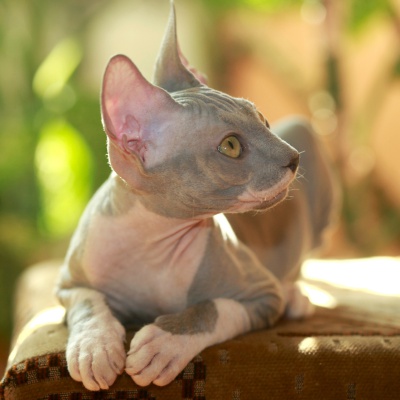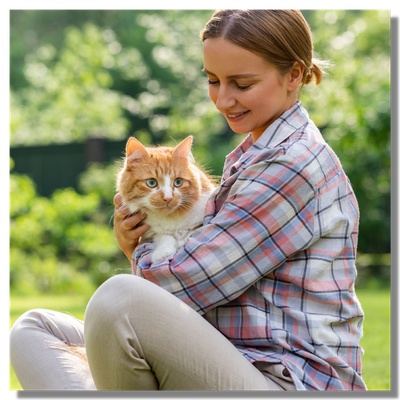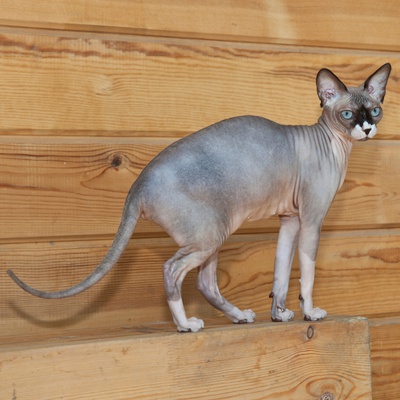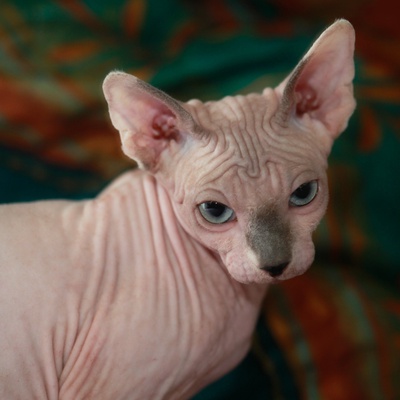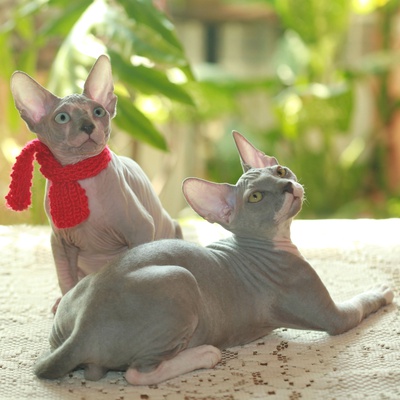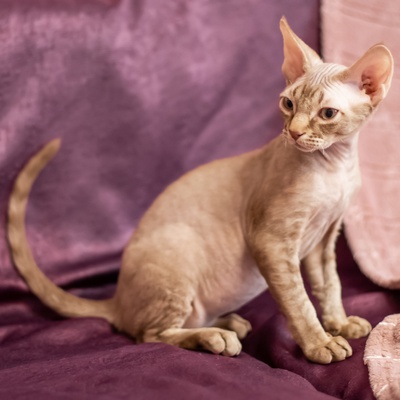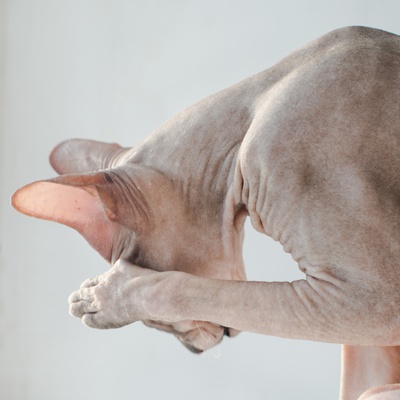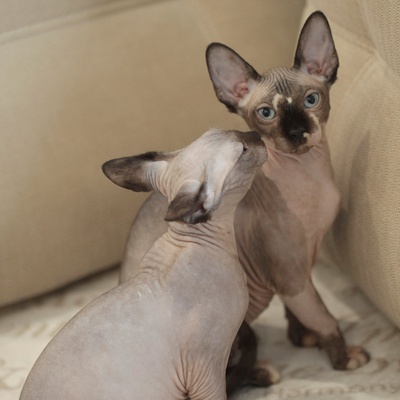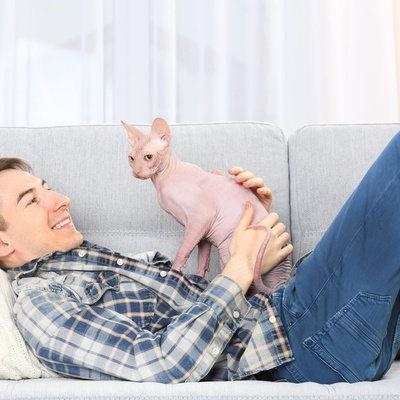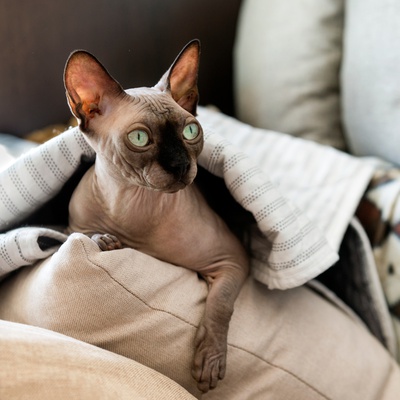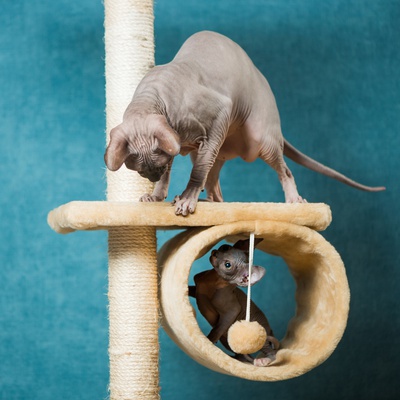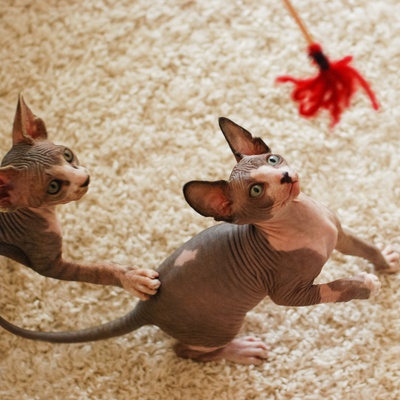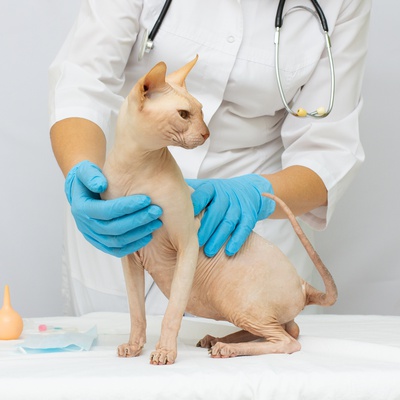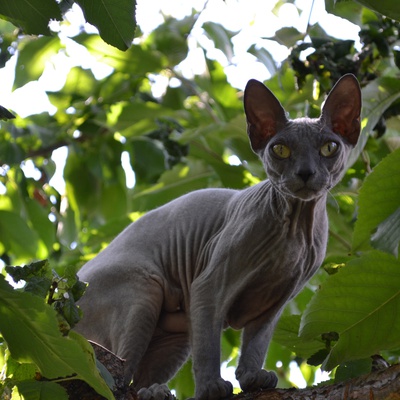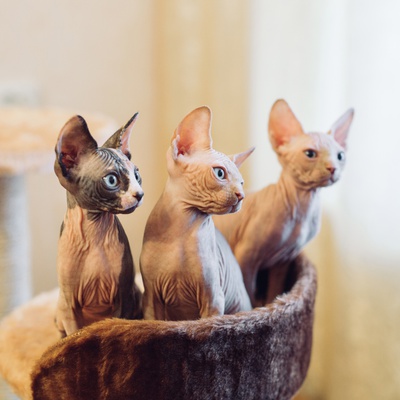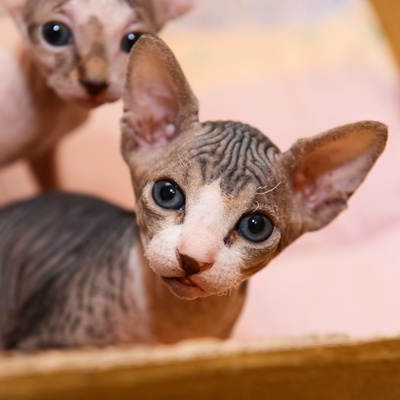Introducing the Sphynx
An essential guide for anyone considering adopting a Sphynx cat. Includes information on how to choose your cat and ensure their health and wellbeing.
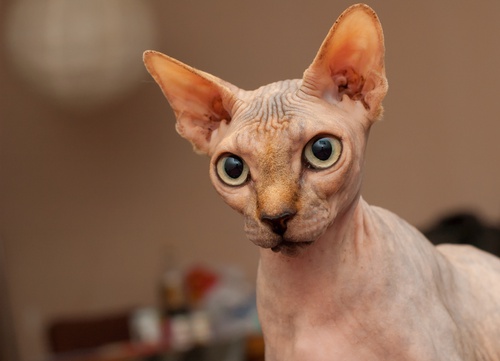
An essential guide for anyone considering adopting a Sphynx cat. Includes information on how to choose your cat and ensure their health and wellbeing.
The Sphynx is undoubtedly an extraordinary breed. Hailing originally from Canada, this breed is the delightful result of careful selective breeding, giving birth to a unique feline that has no coat. This unique trait lends them a surprising elegance and an intriguing appeal that is hard to resist.
The Sphynx is known for its high energy levels and an insatiable curiosity. They are more playful than most breeds, making them lively companions for those willing to provide them with adequate entertainment. Despite their alien-like appearance, these cats are warm-hearted and friendly, offering a unique blend of playful antics and affectionate companionship. You're sure to fall in love with this unusual, hairless companion.
This selection outlines the unique features of the Sphynx breed of cat.
The Sphynx is a medium-sized cat, usually standing about 9-10 inches tall, and weighing between 6 to 12 pounds.
Unlike other breeds, the Sphynx is distinguished by its hairless coat, which gives it a unique, sleek and velvety touch.
Being hairless, the Sphynx is considered hypoallergenic, making it an excellent choice for individuals who are usually allergic to cats.
Despite being hairless, Sphynx cats exhibit a variety of skin colours and patterns, often mirroring what their coat would look like if they had one. These can range from solid colours to spots and stripes.
Sphynx cats are highly adaptable, and can thrive in various environments, as long as they have a warm place to snuggle as they are more sensitive to cold due they are hairless.
Sphynx cats are extremely sociable and affectionate. They get along well with children and other pets, and are known to be friendly towards newcomers.
Sphynx cats are generally healthy, but they can be prone to certain skin conditions and heart diseases like hypertrophic cardiomyopathy, common in their breed.
The Sphynx is an intelligent and playful breed that is quite receptive to training. However, patience and gentleness are key in their training.
We can help you!
Every cat has its own character and specific needs. Making the right choice will ensure his well-being and yours.
Thanks to our quiz, you'll know which breed is right for you, depending on your lifestyle, expectations and many other criteria.
Don't wait any longer and take the quiz to find out the answer!
The Sphynx cat is a breed like no other. Its striking hairless appearance sets it apart, making it akin to a living, purring sculpture in your home.
The Sphynx is a medium-sized breed. On average, they stand at about 9-10 inches tall, with a length proportionate to their height. The weight of a Sphynx can vary slightly based on gender. Females typically weigh between 6 and 8 pounds, while males, being slightly more robust, can weigh up to 12 pounds.
Sphynx cats are known to mature slower than some other breeds, generally reaching their full size and weight around 2 to 3 years of age.
Despite their lack of a coat, Sphynxes have a well-muscled body, a broad skeletal structure and a whip-like tail adding to their distinctive appearance.
Despite being known as the "hairless" cat, the Sphynx actually has a very short and fine layer of downy fuzz, giving them a texture similar to a warm peach. This coat is almost invisible to the eye and is only really noticeable when you touch them. Its lack of hair drastically reduces the risk of allergens spreading, making it virtually hypoallergenic.
Sphynx cats come in a wide array of colors and patterns. Despite their lack of hair, their skin color can mimic what their fur would look like, and can range from white, black, blue, and red, to various tabby patterns and tortoiseshell. Even though they may lack the traditional coat, Sphynx cats are every bit as diverse as their furry counterparts.
The Sphynx is not just a hairless breed, but it also stands out due to its striking physical characteristics. Sphynx cats possess a medium-sized body with an athletic build and a well-muscled torso. Their head is a modified wedge shape with prominent cheekbones and whisker pads.
The ears of a Sphynx are particularly noteworthy; they are very large and wide-set, giving them an alert and curious look. Their eyes are one of their most captivating features. They are large, lemon-shaped and can be of any color. All these unique traits set the Sphynx breed apart from the rest.
Despite their lack of coat, Sphynx cats are not a low-maintenance breed when it comes to grooming. They need frequent baths to remove the oils on their skin that would usually be absorbed by fur in other cat breeds. Weekly bathing is often necessary to keep their skin healthy and prevent skin problems. Sphynx cats, being naturally curious, can often learn to enjoy their bath time.
Despite the need for bathing, they also groom themselves in the same manner as other cats, and an occasional wipe-down with a damp cloth can help to keep them clean between baths.
The Sphynx is known to be an extroverted, high-energy cat. They are always ready for some fun!
Sphynx cats are known for their extroverted behavior and high energy. They crave human contact and form strong bonds with their families. They are known to follow their owners around the house, seeking attention and even trying to involve themselves in whatever their humans are doing. The Sphynx is also known for its playful nature. Despite its energetic behavior, it appreciates prolonged cuddle sessions.
The Sphynx is quite vocal and has a wide range of vocalizations, including purrs, chirps, and meows, all of which are typically expressed in a gentle voice. As such, they require an owner who is willing to provide them with the necessary attention and care.
The Sphynx is known for its affectionate and easygoing nature. Despite its high energy levels, this breed is usually calm, patient, and easygoing. They get along well with families, children, dogs, and other cats due to their sociable and gentle temperament.
When a Sphynx has had enough, it won't become aggressive but will instead find a quiet spot to relax and recharge. Understanding and catering to these behaviors will ensure a harmonious relationship with this unique and loving breed.
Sphynx cats can adapt to various environments with ease. Their highly sociable nature does not demand the constant presence of their owner but appreciates frequent interaction. They can live in both apartments and larger homes as long as they have enough space to play and explore. Being highly active, they need an environment that caters to their playfulness and curiosity. If you're worried about them running away or being stolen, you can use a GPS tracker.
The Sphynx is a bundle of energy, they're always ready for a game or an exploration session. Due to their high energy levels, it's important to provide plenty of stimulating activities to keep their minds sharp and their bodies active. Interactive play with their owner not only keeps the Sphynx entertained but also strengthens the bond between them.
However, too much boredom can lead to destructive behavior, so keeping them entertained is crucial.
Training for a Sphynx should start as early as possible. Without proper training from a young age, this breed can develop undesired behaviors. Their training should be based on principles such as kindness, reward, firmness, and understanding. Consistency throughout the learning process is important as it helps establish positive behaviors from the start.
The Sphynx responds well to play-oriented training, which aids in mental stimulation and prevents behavioral issues. Thus, implementing a training routine that is both engaging and consistent will ensure a well-behaved and happy Sphynx cat.
The Sphynx, characterized by its charismatic and playful personality, is known for its hardiness when it comes to health. Despite its unusual appearance, this breed generally does not have any specific health problems.
Famed for its hairless coat, the Sphynx generally enjoys robust health and rarely falls ill. However, like any other breed, they can be susceptible to certain inherited diseases such as feline hypertrophic cardiomyopathy and polycystic kidney disease.
A DNA test can be conducted to detect these diseases and prevent their transmission. Regular veterinary visits are essential to keep the Sphynx vaccinated against common diseases like typhus and rabies. In the absence of a fur coat, they are more susceptible to skin conditions and should be checked regularly for any changes or abnormalities.
The Sphynx, known for its lean and muscular body, relies on a quality diet to maintain its physique and health. A nutritionally balanced, high-quality kibble is often the recommended basis of their diet. The addition of supplementary foods such as water-rich green vegetables can further enhance their diet and support the cat's renal system.
Sphynx cats reach their full size relatively quickly compared to other breeds. They generally reach their adult size by about one year of age, so their diet must be adjusted accordingly. Sticking to the same brand of kibble ensures consistency in their diet, and feeding them at set times can help to prevent disruptions to their digestive system.
The Sphynx is quite an active breed that enjoys engaging in playful activities. However, like any breed, they can be prone to weight gain if their diet is not controlled and they don't get enough exercise. Encouraging your Sphynx cat to play, run, and jump can help prevent weight problems and promote their overall health.
Interaction with their owners not only offers them much-needed stimulation and exercise, but also strengthens the bond between pet and owner. Regular play sessions can be a great way to keep your Sphynx cat active and healthy.
The unique and affectionate Sphynx cat is a beloved breed with a devoted following. There are several breeders that specialize in this distinctive breed. However, it is important to consider several factors before proceeding with adoption.
Pedigree breeds like the Sphynx are often bred by professional breeders or catteries. It's crucial to visit these breeding sites prior to adoption to observe the living conditions and ensure the cats are well cared for.
From June 10, 2024 you must have your cat microchipped by the age of 20 weeks old and register its details in a relevant database such as Petlog or The Governing Council of the Cat Fancy (GCCF). This is a legal requirement in Britain, and failure to comply could result in a fine of
.
It's also vital to ensure that thorough health examinations and DNA tests have been carried out on the kitten and its parents to detect any potential hereditary health issues.
The acquisition cost of a Sphynx cat can vary based on several factors. The lineage, pedigree, reputation of the breeder, and age of the cat can all influence the purchase price. The price of a Sphynx kitten can range from
to
, but this can vary.
It's important to understand that owning a Sphynx cat involves more than just the initial purchase cost. There are additional expenses related to their care, including regular health check-ups, grooming, and diet, which need to be factored into your budget. The annual maintenance cost of a Sphynx cat is estimated to be around
to
.
Choosing to adopt a Sphynx cat is a significant commitment, but with their affectionate and playful nature, they make wonderful companions for the right owner.
Choosing a cat that matches your personality and lifestyle will ensure your well-being and his!
To access the most relevant information, suitable payment methods, and delivery in your region, please select the website corresponding to your country.
